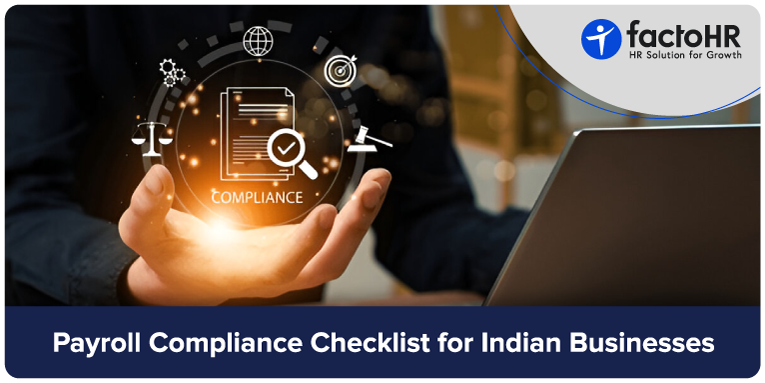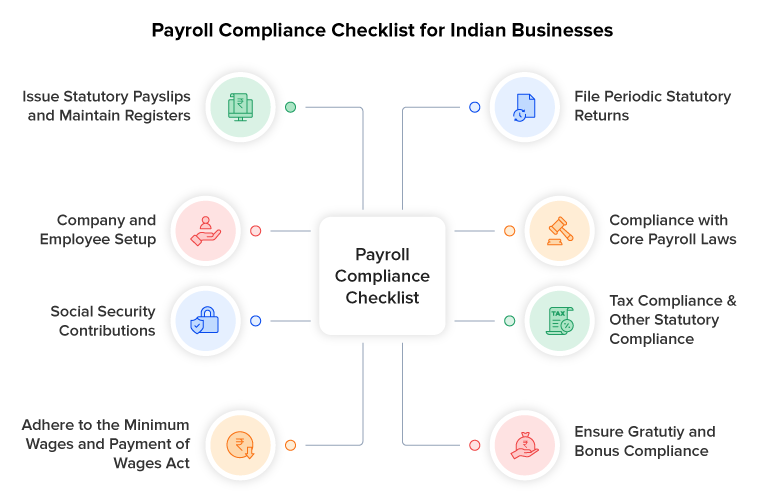Payroll Compliance Checklist for Indian Businesses

Table of Contents
Payroll compliance in India means following all rules related to employee pay. It includes salary payments, tax deductions, and managing employee benefits. Companies must meet these rules to avoid fines and legal issues. Ignoring them can damage a company’s image and affect employee confidence.
Legal trouble may start with late salaries or skipped PF payments. Delays in TDS filing can also bring warnings and heavy penalties. For HR leaders, proper payroll compliance fosters trust and reduces legal risks. Good payroll management helps HR tasks stay clear and on track.
This blog provides a simple payroll compliance checklist for Indian businesses. It helps HR teams follow every payroll rule with clarity on various laws and avoid legal penalties. The checklist gives step-by-step guidance to ensure HR personnel don’t miss anything.

Understanding Payroll Compliance in India
Payroll compliance in India includes accurate pay, tax deductions, and legal benefits. It ensures timely salaries and contributions to employee welfare schemes. Payroll compliance allows businesses to follow the various rules and value their workforce. It also helps create a fair and trusted workplace for everyone.
Non-compliance can affect business operations and damage employee trust. It may lead to legal trouble, higher attrition, and low engagement. As payroll laws vary by state and change often, regular updates are vital. Staying compliant helps avoid fines and supports better HR planning.
A reliable payroll system helps organizations to pay their employees on time and maintain accurate records. It reduces errors and allows HR to focus on other strategic decisions related to workforce management and growth. A payroll compliance checklist makes complex rules easy to follow.
The Ultimate Payroll Compliance Checklist for Indian Businesses
For any business in India, managing payroll compliance is part of daily business activity. It means paying salaries on time, deducting taxes, and meeting legal duties. When practiced correctly, it promotes trust and ensures that these operations are running smoothly. If payroll compliance is not followed, it can lead to legal penalties and employee-related issues.
Payroll laws in India change often; this is why regular updates are necessary. Different states follow different rules, so compliance-related policies must be reviewed regularly.
This checklist helps HR teams ensure compliance with all payroll rules. It turns complicated rules into simple steps that are easy to follow.

Company and Employee Setup
Understanding the core requirements is the first step toward payroll compliance in India. Employers must gather correct employee details and verify them. All records should have joining dates, ID proof, and salary structure. Errors at this stage may lead to legal issues later.
Maintaining accurate records enables companies to comply more easily with payroll laws. Using payroll software to manage staff details allows HR professionals to reduce errors and stay compliant. It helps release salaries on time and file documents without delay. A proper system lets HR professionals handle tasks clearly and without confusion. Keeping records in an accurate manner, shows payment transparency and avoids future problems. These steps protect businesses and make daily work easier for HR.
Compliance with Core Payroll Laws
Payroll-related rules include wages, bonuses, gratuity, and leave rights. Knowing and enforcing them effectively ensures that payroll runs smoothly and remains compliant with the law. HR teams need to pay close attention to payroll-related changes in laws to maintain compliance.
Regular checks and timely updates to payroll policies keep businesses aligned with legal changes. Payroll compliance helps avoid fines and legal issues.
Social Security Contributions
Making timely contributions to social security programs, such as the Provident Fund (PF) and the Employee State Insurance (ESI), is a legal requirement. Employers must deduct and pay social security funds on time to avoid legal consequences. It protects workers and secures their future benefits.
Organizations should always keep clear and accurate records of all payments. Keeping track of rule changes helps avoid mistakes and penalties. To stay compliant, organizations should follow social security laws regularly.
Tax Compliance & Other Statutory Compliance
Businesses should manage TDS deductions and tax payments carefully and with complete accuracy. Delayed filings or errors in payroll taxes can lead to penalties. HR teams must stay updated with tax laws and maintain proper documentation. Timely action supports smooth payroll compliance for organizations in India.
Payroll rules can change and may differ from one region to another. HR must keep pace with these changes to comply with the law. Following clear statutory guidelines helps organizations meet legal duties without damaging the company’s reputation. It reduces the chance of payroll-related errors and helps avoid legal trouble. A clear plan for payroll keeps tasks on track and builds team trust. With everything in place, HR can manage payroll processing without delays or confusion. It also shows the company’s commitment to accuracy and fair treatment.

Adhere to the Minimum Wages and Payment of Wages Act
Employers must ensure the timely payment of salaries to employees while strictly following wage laws. Businesses must comply with both federal and state wage regulations. Missing payments or delays can quickly lead to legal problems. Knowing the latest wage rules helps companies avoid fines and penalties.
HR needs to ensure that each employee is paid at least the minimum wage required by law for every role and location. Companies that follow minimum wages in India stay compliant. Regular payroll checks help detect mistakes early and lower the risk. These steps help build trust and maintain business processes steady and clear.
Ensure Gratuity and Bonus Compliance
Employers are required to process gratuity and bonus payments in line with statutory regulations. It protects employees’ rights and helps build trust in the company. HR must know who is eligible and how to calculate these payments correctly. By following the rules of the Payment of Gratuity Act and the Payment of Bonus Act, the company remains compliant.
Accurate records and on-time payments help organizations to maintain payroll compliance. Maintaining proper records helps avoid issues during audits. When companies follow all payroll laws in India, they can maintain trust among employees.
Issue Statutory Payslips and Maintain Registers
Organizations need to provide each employee with their monthly payslip, which includes salary and various deductions. It should list all earnings, deductions, and the final pay amount. Workers get a clear view of their pay, which builds trust. It also shows that the company follows the law and works ethically.
Keeping proper and accurate records is just as important. These records must track attendance, wages, and employees’ leaves. Well-kept registers protect the company during government audits. They help avoid fines and ensure payroll runs smoothly.
File Periodic Statutory Returns
Submitting required statutory returns on schedule is very important for compliance. It is essential to submit returns, such as PF, ESI, and TDS, on tia timely basis. Following deadlines helps avoid fines and legal problems. HR teams must focus on timely filings to ensure a smooth and compliant payroll process.
Organizations should check payroll records regularly to identify errors promptly and ensure the accuracy of the information. Staying on top of changes in what needs to be filed and when. Missing even a small update can cause delays, or worse, a fine. When things are reported on time, businesses can avoid trouble and stay in the clear. It also shows the employees that the company takes this seriously.

Conclusion
Following statutory compliance in payroll is key for every growing business. It helps avoid legal troubles and builds strong employee trust. Using a clear payroll compliance checklist helps keep tasks in order. It also enables HR teams to adhere to rules and fulfill payroll duties on time.
Payroll compliance management supports smooth business operations and legal safety. Regular audits and timely filings reduce risks and protect the company from fines. HR professionals must stay informed about new payroll laws and changes. Staying up to date reflects a commitment to compliance and strengthens organizational integrity.
Managing payroll becomes simpler when businesses use factoHR in their daily operations. It helps organize records and submit statutory returns without delay. factoHR supports accurate salary processing and allows legal filings to stay on track. With better tools, HR can focus more on hiring and business growth. Stay compliant, stay ready, and build a workplace your team can trust. Schedule a demo with factoHR to see how it works. Get payroll right with less stress and more time for success.
Grow your business with factoHR today
Focus on the significant decision-making tasks, transfer all your common repetitive HR tasks to factoHR and see the things falling into their place.

© 2026 Copyright factoHR


